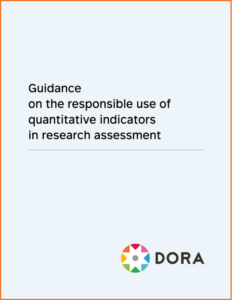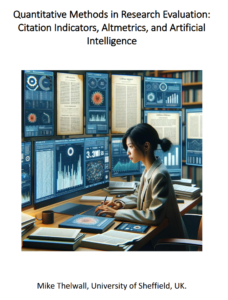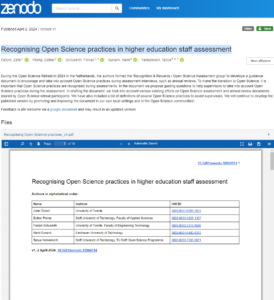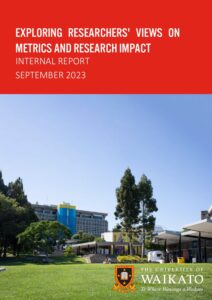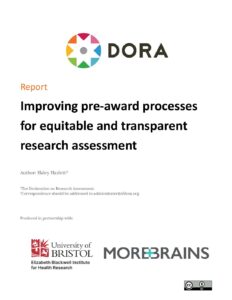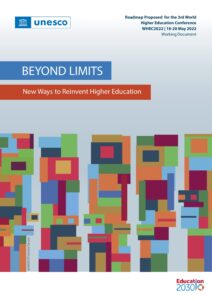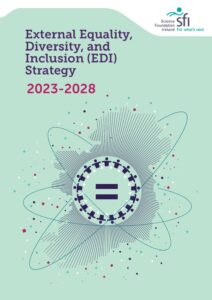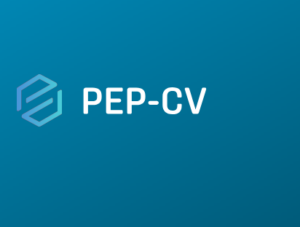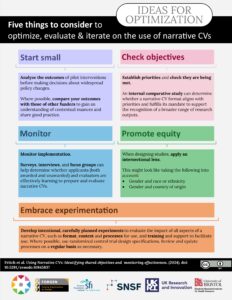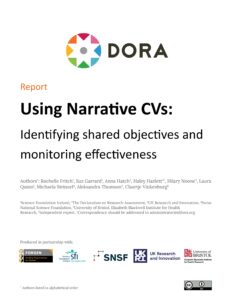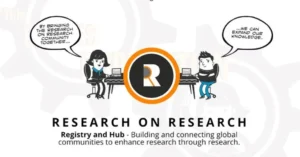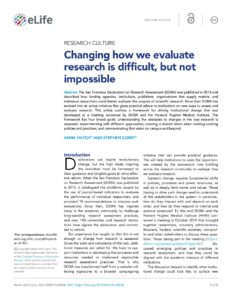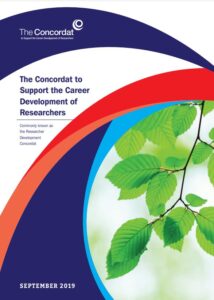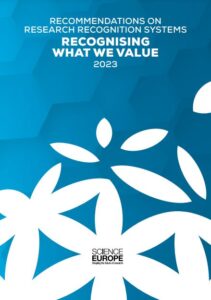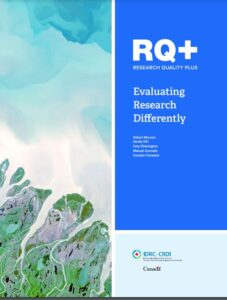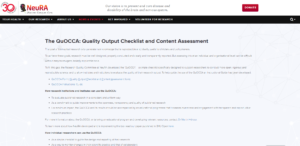A collection of materials to facilitate the development of responsible research and researcher assessment policies and practices.
Search and Filter
Resource type
Intended audience
Advocacy resourcesPolicies and guidancePosition papers
DORA-produced
For: FundersJournals and publishersProfessional societiesResearch institutesResearchers
2024
This document provides guidance on the use of several indicators (sometimes called metrics) used in research assessment: the Journal Impact Factor and other measurements of journals, citation counts, h-index, field-normalized citation indicators, and altmetrics. Five principles guide the use of these metrics: be clear, be transparent, be specific, be contextual, and be fair.
Advocacy resourcesTools
For: FundersProfessional societiesResearch institutesResearchers
2025
These short educational videos in animated and talking head formats provide an introduction to the h-index, a commonly used scholarly metric for assessing authors’ publication output and citation impact. The videos explain how the h-index is calculated, how it is used to assess researchers, and its key limitations. They highlight important considerations, such as disciplinary…
Advocacy resourcesInitiativesTools
For: FundersJournals and publishersResearch institutes
This book critically analyses the value of citation data, altmetrics, and artificial intelligence to support the research evaluation of articles, scholars, departments, universities, countries, and funders. It introduces and discusses indicators that can support research evaluation and analyses their strengths and weaknesses as well as the generic strengths and weaknesses of the use of indicators…
Good practicesPolicies and guidance
For: FundersResearch institutes
2024
This resource compiles questions about open scholarship that pertain to assessment of research, education, outreach, and leadership. The questions for each section are accompanied by definitions of terms used in the questions and links to resources. The authors note that these questions were developed in the context of assessment practices in The Netherlands, but note…
Good practicesPolicies and guidance
For: FundersResearch institutes
2020
This resource compiles questions about open scholarship that pertain to assessment of research, education, outreach, and leadership. The questions for each section are accompanied by definitions of terms used in the questions and links to resources. The authors note that these questions were developed in the context of assessment practices in The Netherlands, but note…
Advocacy resources
For: FundersJournals and publishersProfessional societies
2023
This internal report for the University of Waikato investigates researchers’ perspectives on metrics and their influence on research impact, highlighting a multifaceted view of the role these metrics play in the academic landscape. While researchers generally acknowledged the usefulness of metrics, they were concerned about the over-reliance on these metrics, which can lead to a…
Position papers
DORA-produced
For: Funders
This is a short report summarizing the key takeaways from a workshop co-organized by the San Francisco Declaration on Research Assessment (DORA), the University of Bristol, Elizabeth Blackwell Institute for Health Research, and the MoreBrains Cooperative. The aim of the online workshop was to develop actions to improve the processes that take place before research is…
Advocacy resourcesGood practicesPolicies and guidance
For: FundersProfessional societiesResearch institutes
2022
This document from UNESCO is a roadmap for higher education, prepared for the “3rd World Higher Education Conference (WHEC2022).” Within the roadmap are “signposts for co-creating more open, inclusive, equitable and collaborative higher education systems that democratize access and knowledge.” Recognizing the evolution of and advancements in higher education, UNESCO has outlined 5 sections discussing…
Good practicesInitiativesTools
For: FundersProfessional societiesResearch institutes
2024
The Young Universities for the Future of Europe (YUFE) Transforming R&I through Europe-Wide Knowledge Transfer (YUFERING) project is a comprehensive initiative aimed at transforming Research and Innovation (R&I) practices across Europe by facilitating widespread knowledge transfer. It seeks to bridge the gap between researchers, innovators, and stakeholders by promoting collaboration and communication through existing networks…
Good practicesInitiativesPolicies and guidance
For: FundersResearch institutes
2023
Science Foundation Ireland’s (SFI) Equality, Diversity, and Inclusion (EDI) Strategy 2023-2028 is centered on SFI’s ambition that “its EDI Strategy will be a key driver of an inclusive, engaged research culture and, through this Strategy, SFI will be an agent of change.” The Agency aims to “lead in minimising barriers and ensuring that everyone has…
Tools
For: FundersProfessional societies
2024
The Peer Exchange Platform for Narrative-style CVs (PEP-CV) is a free and open resource for everyone in research and innovation to add to existing guidance on narrative CVs. As a not-for-profit initiative, the PEP-CV platform is a collaborative effort among funders, institutions, and researchers that fosters a culture of collaboration, mutual learning, and expands national…
Tools
DORA-produced
For: FundersResearch institutes
2024
This one-page tip sheet is a part of the short report Using Narrative CVs: Identifying shared objectives and monitoring effectiveness. In February 2022, DORA organized the online workshop series “Using Narrative CVs: Identifying shared objectives and monitoring effectiveness” in partnership with FORGEN CoP, Science Foundation Ireland, the Swiss National Science Foundation, UK Research and Innovation,…
Position papers
DORA-produced
For: FundersResearch institutes
2024
In February 2022, DORA organized the online workshop series “Using Narrative CVs: Identifying shared objectives and monitoring effectiveness” in partnership with FORGEN CoP, Science Foundation Ireland, the Swiss National Science Foundation, UK Research and Innovation, and the University of Bristol, Elizabeth Blackwell Institute for Health Research. The aim of the workshop was to develop a…
Advocacy resourcesGood practicesPosition papers
For: FundersJournals and publishersProfessional societiesResearch institutes
There is a growing recognition that current evaluation metrics often fail to capture the breadth and depth of research impact. In hopes of addressing the reform needed in the research world the Global Young Academy, the InterAcademy Partnership, and the International Science Council have collaborated in conducting a global assessment of research evaluation perspectives. Their…
Good practicesTools
For: FundersResearch institutes
In 2022 Trinity College Dublin launched The Researcher Impact Framework (RIF), a tool designed to help researchers understand and communicate the impact of their work in four key areas: Knowledge generation Development of others and collaborations Contribution to the research community Addressing broader societal challenges The RIF originated from Trinity College Dublin’s Research Impact Pilot…
Initiatives
For: FundersResearch institutes
2023
Research on Research (RoR), also known as meta-research or the science of science, focuses on enhancing research practices to ensure research transparency, efficiency, and benefit. The RoR registry and hub, launched in 2021 by the University of Southampton and the National Institute for Health and Care Research, provides a free online platform for recording and…
Journal articles
DORA-produced
For: FundersResearch institutes
2020
Based on discussions at a meeting DORA co-sponsored with the Howard Hughes Medical Institute in October 2019, DORA developed a framework for driving institutional change.
Good practices
For: FundersResearch institutes
2019
The Researcher Development Concordat is an agreement among organizations in the UK in support of career development of researchers. It outlines a set of principles and requirements aimed at fostering a sustainable research culture within UK research institutions. The Concordat is focussed on the rights and obligations of researchers who are primarily engaged in research…
Good practices
For: FundersResearch institutes
2022
The Adaptation Research Alliance (ARA) was launched at the United Nations Climate Change Conference in 2021 as a global collaborative effort for increased investment and action, to catalyze action oriented research for effective adaptation to climate change. The Principles are focused in supporting and influencing climate change adaptation initiatives, and research in general. The six…
Good practices
For: FundersResearch institutes
2023
Rewards and recognition play fundamental roles in identifying research and innovation talent. In 2022, Science Europe created the Science Europe Values Framework for research organizations. In this 2023 piece, Science Europe builds on its Values Framework and provides practical recommendations and good practice examples that can drive positive research culture at the institutional level. There…
Good practices
For: FundersJournals and publishersResearch institutes
2023
The Luxembourg National Research Fund (FNR) introduced a standardized narrative-style CV format in 2021 as a requirement for applicants to all of FNR’s funding schemes. This new format was introduced to streamline and simplify the evaluation process, broaden the types of contributions considered during review, and to align with DORA’s principles that research should be…
Good practices
For: Funders
2022
Strengthening equity in international research partnerships can help address the current power imbalances that characterize the global research ecosystem and improve the ethical integrity of research agendas and knowledge production. This document was jointly created by the UK Collaborative on Development Research (UKCDR) and ESSENCE on Health Research to provide practical advice and actionable steps…
Good practices
For: FundersResearch institutes
2022
Research Capacity Strengthening (RCS) is essential for developing people and institutions, fostering collaborations, and building supporting infrastructure that enables research actors to thrive. Through responsible funding and evaluation frameworks, inclusive and sustainable research capacity can be built. Recognizing this, in 2022 the UK Collaborative on Development Research (UKCDR) published a report that collates learnings from…
Tools
For: FundersJournals and publishers
2022
The International Development Research Centre (IDRC) in Canada developed a tool called Research Quality Plus (RQ+) to assess and improve quality of research . The three tenets of RQ+ approach are: identify contexts of research, quality is multi-dimensional, and use of rubrics for systematic and empirical appraisal. RQ+ Approach has five major applications: Priority Setting:…
Tools
For: FundersJournals and publishersResearch institutes
2022
The Research Quality Committee at Neuroscience Research Australia (NeuRA) has developed a new tool to assess and improve scientific research quality and reproducibility: Quality Output Checklist and Content Assessment (QuOCCA) The QuOCCA was designed after extensive research and feedback from external experts and researchers. The QuOCCA was specifically created to assess a broad spectrum of…

